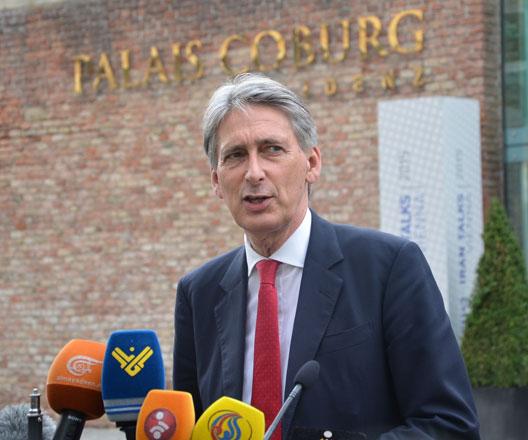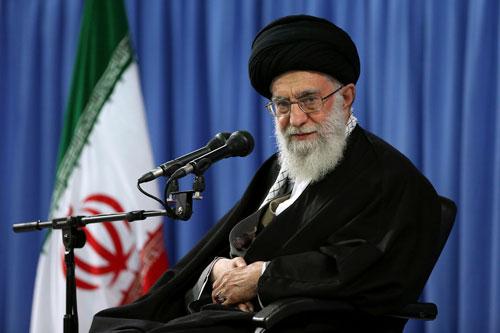You are here
Six powers and Iran to continue nuclear talks past deadline
By Reuters - Jul 07,2015 - Last updated at Jul 07,2015

British Secretary of State for Foreign and Commonwealth Affairs Philip Hammond speaks to the media in front of the Palais Coburg Hotel, where the Iran nuclear talks are held, in Vienna, Austria, on Tuesday (Photo by Hasan Tosun - Anadolu Agency)
VIENNA — Iran and six major powers will keep negotiating past Tuesday's deadline for a long-term nuclear agreement as they tackle the most contentious issues, including the continuation of a UN arms embargo on Iran, the big powers said.
"We are continuing to negotiate for the next couple of days," EU foreign policy chief, Federica Mogherini, said outside the hotel where the talks between Iran, Britain, China, France, Germany, Russia and the United States are taking place.
The spokeswoman for the US delegation, Marie Harf, said the terms of an interim deal between Iran and the six would be extended through Friday to give negotiators a few more days to finish their work.
"We're frankly more concerned about the quality of the deal than we are about the clock, though we also know that difficult decisions won't get any easier with time," Harf said.
“That is why we are continuing to negotiate.”
The United States and its allies fear Iran is using its civilian nuclear programme as a cover to develop a nuclear weapons capability. Iran says its programme is peaceful.
An agreement would be the most important milestone in decades towards easing hostility between the United States and Iran, enemies since Iranian revolutionaries captured 52 hostages in the US embassy in Tehran in 1979.
A deal would be an important achievement for US President Barack Obama and Iran’s pragmatist President Hassan Rouhani, but both leaders face scepticism from powerful hardliners at home.
Russian Foreign Minister Sergei Lavrov said there was “every reason” to believe a deal would be done within “a few days”, and that there was an “understanding” that most of the current sanctions against Iran would be lifted.
“There is only one big problem in terms of sanctions — it is the problem of a weapons embargo,” he told journalists according to Russian news agency Interfax.
He said it was important to reach agreement on this as soon as possible, saying that “ending the bans on supplies to Iran of the weapons required to fight terrorism is a very, very relevant objective”.
It is the fourth time the parties have extended the terms of the interim deal, which was struck in November 2013 and provided Iran with limited sanctions relief in exchange for a halt to the production of uranium enriched to a purity level of 20 per cent.
Extension extended
The comprehensive deal under discussion is aimed at curbing Tehran’s most sensitive nuclear work for a decade or more, in exchange for relief from economic sanctions that have slashed Iran’s oil exports and crippled its economy.
The negotiators had initially given themselves an extra week when they missed a June 30 deadline for a final agreement, but a push in recent days was not enough to hammer out the deal.
The latest extension to Friday leaves open the possibility that an agreement will not arrive in time for a Thursday deadline set by the US Congress in order to provide an expedited, 30-day review.
If a deal is sent to Congress between July 10 and September 7, Congress will have 60 days to review it, taking into account lawmakers’ August vacation. Obama administration officials fear that could provide more time for any deal to unravel.
“We are interpreting in a flexible way our deadline, which means that we are taking the time, the days we still need, to finalise the agreement,” Mogherini said, adding that there remained several difficult issues to resolve.
Among these, officials said, are Iranian demands for a UN arms embargo and ballistic missiles sanctions to be lifted, the timing of US and EU sanctions relief, and disagreements over future Iranian nuclear research and development.
A senior US official said UN restrictions would remain both on Iran’s trade in arms as well as its access to missile technology but left open the possibility that these might be less onerous than they are at present.
UN restrictions on the development of Iran’s missile programme date to 2006. They call for Iran to abandon its ballistic missile programme and aim to prevent it from developing “nuclear weapon delivery systems”, which diplomats say covers any missile capable of delivering an atomic warhead.
“There will be an ongoing restriction on arms just like there will be ongoing restrictions regarding missiles,” the senior US official told reporters. Asked if these would be as tight as those now in effect, the official declined comment.
While US Secretary of State John Kerry and Iranian Foreign Minister Mohammad Javad Zarif planned to remain in the Austrian capital to continue negotiating, the majority of the other foreign ministers planned to leave, some for only 24 hours.
US officials are loathe to ease the conventional arms embargo against Iran, fearing it would allow Tehran to provide greater military assistance to militants in Yemen, Syria or elsewhere in the Middle East.
Related Articles
VIENNA — A historic nuclear compromise within sight, American and Iranian negotiators struggled Monday to clear the final obstacles to an ag
UNITED NATIONS — US Ambassador to the United Nations Nikki Haley will travel to Vienna later this month to discuss Iran’s nuclear activities
Iranian Supreme Leader Ayatollah Ali Khamenei on Thursday demanded that all sanctions on Iran be lifted at the same time as any final agreement with world powers on curbing Tehran's nuclear programme is concluded.
















